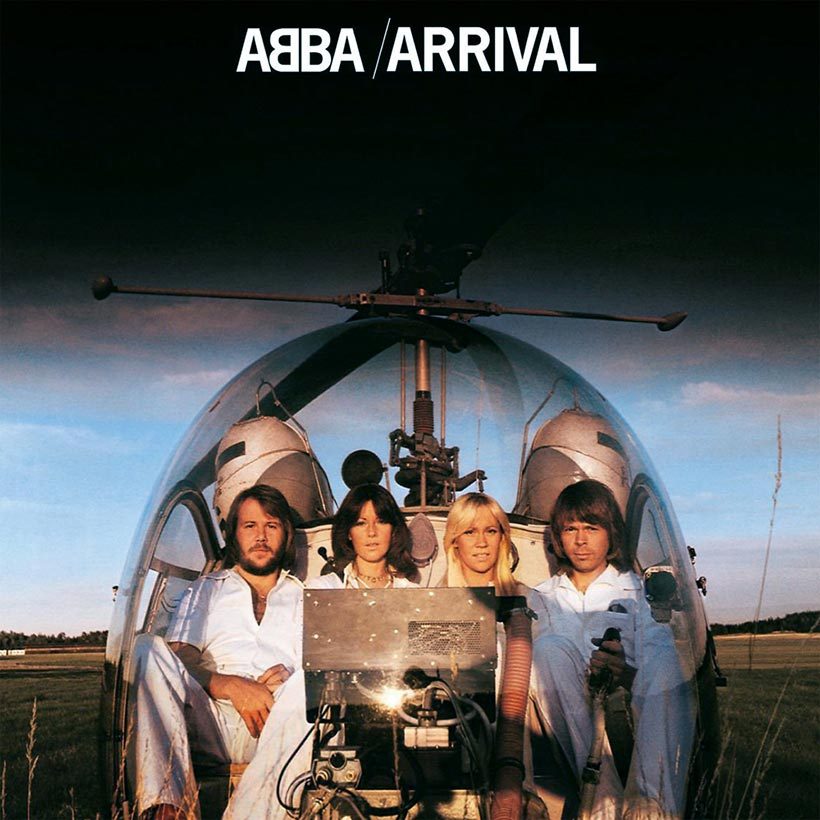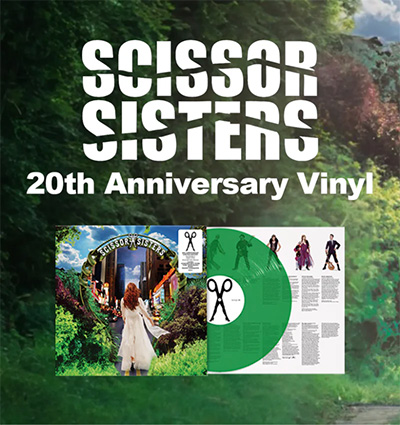‘Arrival’: The ABBA Classic That Scored A Winning Touchdown
ABBA’s fourth album, ‘Arrival,’ went on to become the best-selling album in the UK in 1977, and contains their finest moments on record.

Released on October 11, 1976, ABBA’s fourth album Arrival marked the moment when everything moved up a gear for the group. The Eurovision Song Contest of 1974 was two years behind them and momentum was building. The UK successes of “Mamma Mia” and “SOS” had been something of a surprise; no Eurovision winner had managed to use that exposure to launch a career like this.
Arrival, issued just six months after the group’s first greatest hits collection, was a 10-song salute to that growing confidence – the sort of album created when fortuitous circumstances collide to create a rare supernova of opportunity.
That Arrival contains ABBA’s finest moment, the euphoric “Dancing Queen,” seems entirely appropriate. Singer Anni-Frid Lyngstad recalls that the song, originally entitled “Boogaloo,” seemed special even in its earliest demo form; it moved her so much that she cried. The song was the first from the album to be released as a single, made to No. 1 in the UK, and gave the band its biggest U.S. hit when it also topped the charts stateside.
Work had started on Arrival the previous year, but was not completed until the summer of 1976, when “Fernando” – originally recorded by Frida as a solo track, and added to the Australian edition of the album, along with its later international reissues – was topping the charts. Those final sessions included the completion of “My Love, My Life,” the sort of aching ballad that ABBA did so well – poignant, with an accessible melody that emerges slowly at first. It remains one of Agnetha Fältskog’s classic recordings and a standout of this set.
The earlier “When I Kissed The Teacher” actually opens the album with its echoes of the 60s girl-pop sound, dressed up in the 70s supersonic studio sheen that illustrated why Benny Andersson and Björn Ulvaeus were the best of the era’s producers as well as masterful songwriters. “Dum Dum Diddle” is light and frothy: one of the breeds of nagging earworms that, for years, fed the band’s reputation as peddlers of silly, tinny pop that was to rob the Swedes of a fair critical assessment. Actually, however, at the song’s heart is the joyful melancholy that underpins the best of ABBA’s melodies: the faintly masochistic cheer at the center of so much sadness; the final dance as the world comes crashing down around you.
“Knowing Me, Knowing You” – a five-week UK chart-topper on its release the following year – is another ABBA classic. Benny believes it’s one of the band’s five best recordings, its knowing lyrics hinting at future heartbreak no one would have seen coming. “Money, Money, Money” had the unenviable task of following “Dancing Queen” as a single when it was released at the end of the year. Its strong chart placings around the world showed it actually performed the job admirably.
Elsewhere, “That’s Me” owes its lilting disco melody to the era in which it was created. It’s truly no leap to imagine someone like Olivia Newton-John singing this, but she’d certainly have failed to do it justice. Only Agnetha and Frida’s near-perfect pitch could honor the track’s range and restless energy. “Why Did It Have To Be” is a rare opportunity for Björn to take a lead vocal, joined in parts by Agnetha and Frida. On first play, this duet sounds like the sort of old-school track Benny’s former band The Hep Stars might have recorded. The song, waltz-like in its simplicity, is elevated into something rather more special on repeated listens.
“Tiger” has a frantic relentlessness. The song stalks you with an incessant riff that seems at odds with much of the rest of the album. If ABBA would ever claim to get close to recording rock music, this is an example. There are shards of musical light that draw the song towards a more familiar pop approach, but it’s a catchy oddity with throwaway lyrics that initially confused fans who were getting used to a deeper, more emotional pitch from the group. The album’s instrumental title track also sits oddly at first – Agnetha and Frida’s voices are heard only in a fleeting choral harmony as the wistful tune builds across its three minutes. It came from Benny’s love of Swedish folk and was originally called “Ode To Dalecarlia” before being retitled when the LP was named.
Across just 10 songs, this eclectic album often feels like the score of a stage musical in search of a play to wrap itself around. In many ways, that was the brilliance of the band – the songs ABBA created were canvasses upon which the whole world could project an emotional perspective. Deceptively simple in approach, fiendishly detailed in their execution, this was masterful storytelling.
Planet Earth fell pretty heavily for Arrival. It landed records everywhere and even performed well in the US – a market that would ultimately wait another generation before properly falling for the charms of Swedish pop – where it would enter the charts on January 22, 1977. In the UK, however, it was the best-selling album of 1977, and became nothing less than a national sensation in Australia – only the second album in the nation’s history to sell more than a million copies.
There was simply no better pop band so dedicated to focusing on a simple ambition: crafting the perfect three-minute pop song. Arrival sees ABBA’s four stars at the top of their game – confident and instinctive – and is rightly claimed as one of the best pop classics of all time.













Ryan
June 24, 2016 at 4:11 pm
Brilliant album, brings back many memories.
Brian McGlenn
June 26, 2016 at 4:23 pm
Music for little girls and housewives.
veronique
July 18, 2016 at 7:03 am
Mijn favoriete groep,heb al hun nummers;abba de max
Eduardo Álvares
August 31, 2016 at 3:24 pm
Many music stars had this perfect album between their 10 favourites ones by that time, including Alan Parsons. The critics didn’t want to listen it well as it deserved but the world did. A Classic mastespiece that changed pop music forever.
GIORGIO
September 14, 2016 at 2:22 pm
My favorite group.
Sunitha Mohandas
September 18, 2016 at 1:50 pm
Memories,memories,memories…..so many!!!!
Henrik Johansson
September 18, 2016 at 9:50 pm
It was the first rekord I ever nougat! Still love it!
Momo
September 19, 2016 at 9:14 am
Best songs best Abba
Rick
January 22, 2017 at 11:01 am
I’m always torn between Arrival or The Album being my favorite album. They are both brilliant but I think The Album has better songs overall, but Arrival has Dancing Queen and Knowing Me Knowing You…the two best ABBA songs of all time.
Darren Saxby
October 29, 2017 at 11:28 pm
Arrival was a far better album in my opinion.. I loved Take A Chance On Me, That was my standout track I just thought the whole album as fantastic and the songs wonderful, , but I think Arrival was a far more cohesive and flowed better. And when you have such songs as Dancing Queen, Knowing Me, Knowing You, My Love My Life, Money Money Money and so on.. Well it don’t get much better than that..
pradip retharekar
January 22, 2017 at 11:13 am
love abba since I was teen
G Crichton
January 22, 2017 at 9:57 pm
Brian McGlenn, this is for you. A Famous Music Critic Once said `If you dont understand `ABBA` You dont understand POP music` Thats you`re Problem!!!!
Dave hanson
October 29, 2017 at 9:58 pm
Still one of my favorites
Darren Saxby
October 29, 2017 at 11:23 pm
Not one album filler on this amazing album… A true pop masterpiece. Still sounds as amazing today as it did when I first heard it on cassette back in 1976…. #ThankyouForTheMusic
Jimmy Cunliffe
November 3, 2017 at 6:33 pm
Can you tell me when the new ABBA 3 singles in vinyls are coming out
petarle
October 12, 2021 at 10:44 am
I have this album,i love Abba
Greg Lovern
October 14, 2021 at 4:02 pm
From the time I heard “Knowing Me, Knowing You” at a roller skating rink in middle school around 1978, ABBA has been my favorite. But as an American teenage boy, I learned to avoid mentioning it. When I did, I invariably got the side-eye. And it probably contributed to my reputation as being gay (I’m not). Back then and in the smallish agrarian town I lived in, being gay was practically a felony.
There’s always been a lot of talk about how they didn’t get the respect and popularity in America that they earned, recieved, and richly deserved everywhere else in the world because their songs were bubbly and lightweight. But that didn’t stop other bands from becoming very popular and respected at the time–Bee Gees, anyone? We could list many others.
Then there were the wacky clothes in the early years. But others wore outlandish clothes on stage in the early 70s; ABBA just went further with it–much further.
No, I think the reason ABBA didn’t connect with Americans was because aside from Benny, they just didn’t look and act the part. Though the marketing pretended Frida and Agnetha were beautiful and hot, the truth is that they’re just not. They look like average girls next door. And Bjorn was geek central. And none of those three had the charisma for a commanding stage presence.
Only Benny had the looks and charisma to fit the superstar image, and though he composed all the songs, he was never the lead singer for any song. ABBA just didn’t fit any of America’s prefab cubbyholes for what superstars where supposed to look like, so America didn’t understand them.
Sebastian Baca
October 12, 2022 at 7:52 pm
Big boys like some ABBA as well…and my tastes run the gamut from country to metal!